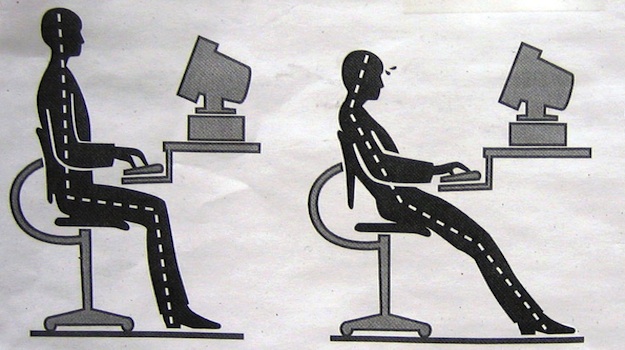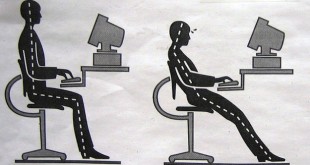
I doubt there’s a single person reading this who isn’t aware of the fact that prolonged computer usage is accompanied by negative health implications. However, it is probably not something that you give a great deal of thought to.
And that is a major issue, because we are exactly the type of people who need to sit up and pay attention to such matters. By “we”, I mean intensive computer users. You may be a WordPress blogger, a web designer, or a developer. All of these disciplines require long hours in front of a screen. And those hours can really take their toll.
With that in mind, today I want to explore the potential (and actual) issues we face as intensive computer users, and how methods of combating computer-related injuries can not only benefit your health, but also your productivity.
Common Problems Faced by Intensive Computer Users
As our society becomes more and more sedentary, workplace injuries are evolving.
Ten years ago, back injuries in the workplace were most commonly attributed to heavy lifting. These days, the cause is more likely to be related to sitting at a desk for prolonged periods of time. The average age of carpal tunnel syndrome sufferers was late 30s to early 40s — it is now mid 20s.
Furthermore, it has been proven that sitting in front of a computer screen for five or more hours a day can dramatically increase the risk of insomnia and/or depression. How long do you spend in front of a screen on a daily basis?

In addition to the above injuries and maladies, intensive computer users can suffer from the following during their lifetime (and more):
- Neck, shoulder and arm pain
- Tension headaches
- Pain, swelling and stiffness of joints
- Eyestrain and vision problems
- Stress
I’m just scratching the surface here, but these issues are highlighted by the astonishing cost of computer-related injuries (CRIs) to US businesses, which is estimated to be in the region of $60-100 billion.
What Are the Common Causes of CRIs?
There are no particularly complicated causes of CRIs. You could probably take a look at your daily computer usage habits and spot exactly what you are doing that has negative health implications:
- Poor and static posture
- Prolonged sitting
- Repetitive movements
- Looking at a screen for a prolonged period of time
So if we know what causes most CRIs, the question then is, how do we prevent them?
CRI Prevention
As much as the common causes of CRIs are pretty obvious, the things you should do in order to prevent them are also rather self-explanatory:
- Optimize your workstation for maximum comfort
- Purchase an ergonomic chair and be aware of your posture
- Take periodic breaks from your computer — get out of your chair, walk around, and stretch
- Avoid eye strain by looking away from your screen frequently
- Use a light touch when typing
- Try to avoid high-stress situations like tight deadlines (easier said than done, admittedly)
So now we understand what causes CRIs, and we also understand how to cure them. The next obvious question therefore is, why is it that CRIs are such a major issue? The problem is of course in implementing and sticking to new, healthy habits.
Making It Work
It should be clear that the above mentioned improvements to your workplace habits can have clear health and productivity benefits. Generally speaking, if you are healthier and happier, you will be more productive. More specifically, according to the New York Times, a growing body of evidence suggests that those regular breaks you’ll now be taking serve to increase productivity.

Having said that, it is an unfortunate fact that many people who have read this far will probably fail to establish healthier habits in the long run. The simple reason for this is because new habits are really tough to establish. Everything you do to establish a habit until it actually becomes one requires conscious effort, and that can be tough to keep up. In fact, research has demonstrated that it takes (on average) 66 days to establish a new habit.
In my opinion, there are three main ways in which you can combat the struggle to establish new habits:
- Understand that forming habits is a process — what is difficult to do today can eventually become second nature.
- Start with small habits and work your way up incrementally — smaller habits take less time to establish, and will provide positive motivation.
- Continuously remind yourself of the potential benefits of the habit you are forming, and the potential repercussions if you do not stick to it.
Are You Healthy?
I would love to know how you feel about your current workplace conditions and habits. Do you think that you work in a healthy environment? Do you have healthy habits? Let us know in the comments section!
Additional Sources
- http://www.betterhealth.vic.gov.au/bhcv2/bhcarticles.nsf/pages/Computer_related_injuries
- http://karim-ouda.blogspot.com/2012/04/computer-related-health-problems-and.html
- http://www.bhj.org/journal/2004_4505_jan/html/computer_37.htm
- http://www.rsiprevention.com/rsi_prevention.php
- http://www.rsi-relief.com/2008/11/a-list-of-rsi-prevention-tips/
- http://www.healthycomputing.com/office/setup/index.html
- http://www.healthycomputing.com/health/index.html
- http://www8.hp.com/us/en/hp-information/ergo/
- http://www.medindia.net/patients/lifestyleandwellness/computer-related-injuries.htm
- http://www.rsi-solutions.co.uk/
- http://www.keytools.co.uk/rsi-stats.html
- http://www.allaboutvision.com/cvs/irritated.htm
- http://www.lifehack.org/articles/lifehack/ten-ways-that-computer-can-ruins-your-health.html
- http://www.pickthebrain.com/blog/8-reasons-why-you-fail-at-creating-new-habits/
- http://zenhabits.net/fail/
- http://www.workrave.org/
Creative Commons image courtesy of joelogon, DeaPeaJay and gadl

Leave a Reply